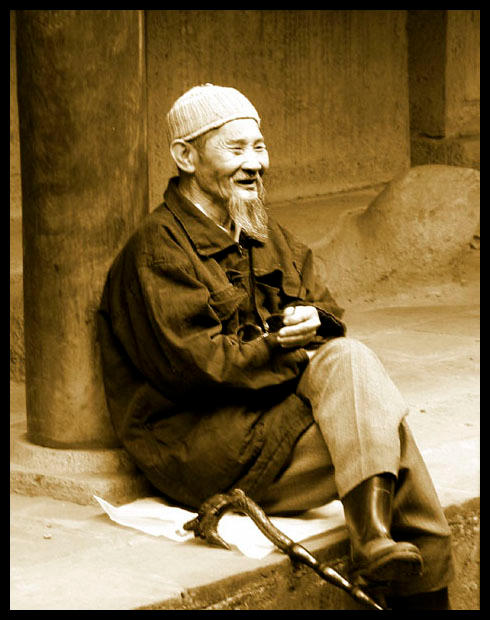I begin to think that it is time for a massive reprogramming of Homo Sapiens’ way of being in the world. A key to this process may be the Buddhist concept of ‘no-self’ (Anatta).
The ‘self’ has no abiding reality, nor does it have a physical presence in the world. It does, however, quasi exist as a thought with feelings and it is subject to causes and conditions. It changes. Taking it for ‘real’ is the main psychological cause of human suffering.
 |
| Rope or snake - how to react? |
You gather your nail and hair clippings over several years. There are big piles. To what extent are they ‘you’? Cut off your legs are you still you? Cut off your arms, then your body. Are you still you? Open your skull and cook your brain. Do ‘you’ still exist?
Our ‘self’ exists but only as a passing thought/feeling.
Before - he was profane and ordinary. He reacted to the world like a robot expecting things, especially himself, to last forever. He was driven by his automatic feelings and desired some things, avoided others, and was neutral about the rest. He avoided thinking about sickness, old age and death so when he experienced them he was seriously unprepared and upset.
After – he was sacred and extra-ordinary. He made calm and thoughtful responses to stimuli from the external world and was aware of the impermanence of all created things - especially his viewpoints and feelings. He renounced excessive consumption and led a simple life. He built time for quiet stillness into his daily routine.
‘Higher’ states of consciousness come in various forms and some are quite common. People of a poetic persuasion are often bewitched by numinousness:
“To see a world in a grain of sand, And a heaven in a wild flower,
Hold infinity in the palm of your hand, And eternity in an hour.”
(William Blake)
“There was a time when meadow, grove, and stream,
The earth, and every common sight, to me did seem
Apparell'd in celestial light,
The glory and the freshness of a dream.
(BUT, unfortunately for Willy,)
It is not now as it hath been of yore;
Turn wheresoe'er I may,
By night or day,
The things which I have seen I now can see no more.
(William Wordsworth)
Other more or less common states of consciousness include:
- Flow as described by Mihalyi Csikszentmihalyi. The Muse speaks through the poet, the athlete is in the Zone, the musician is in the Groove, the gardener is at One with the universe. People have peak experiences.
- Insight comes to the meditator after stilling the brain. “What is this life if, full of care, we have no time to stand and stare” (William Davies the vagabond poet)
- Epiphany (self actualisation) comes to those experiencing cosmic consciousness and near death experiences.
Common to all these ‘higher’ states of consciousness is the experience of no-self (the non-experience of ‘self’), the absence of felt time or space, a numinous awareness of surroundings, and often an at-One-ment (Coming home to the Oneness that is everything).
Language did not evolve to deal with the numinous Oneness. People who come back from an epiphany invariably say that words cannot do it justice. This point is made at the beginning of the Taoist Classic the Tao teh Ching which states that “the reality which can be described is not the real reality.” It also cheekily notes that “those who know do not speak, and those who speak do not know.”
 |
| the sage's smile |
There is no longer any need to leave things up to serendipity. Global power structures are changing. There are rapid advances in neurology and evolutionary psychology and there are plans to teach Big History all across the planet. We are rapidly reaching the stage of being able to choose the direction of our future cultural and biological evolution. But this calls for wise brains and that calls for stillness to liberate the no-self.
Sitting quietly doing nothing
Spring comes
And the grass grows by itself
(Basho)
Spring comes
And the grass grows by itself
(Basho)
“No-self, no problem”
(Zen saying)
No comments:
Post a Comment